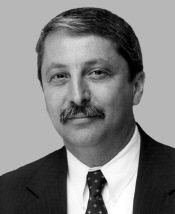Sam Gejdenson
This article includes a list of general references, but it lacks sufficient corresponding inline citations. (March 2013) |
Sam Gejdenson | |
|---|---|
 | |
| Member of the U.S. House of Representatives from Connecticut's 2nd district | |
| In office January 3, 1981 – January 3, 2001 | |
| Preceded by | Chris Dodd |
| Succeeded by | Rob Simmons |
| Member of the Connecticut House of Representatives from the 48th district | |
| In office January 8, 1975 – January 3, 1979 | |
| Preceded by | James H. Brannen III |
| Succeeded by | Martin M. "Marty" Masters |
| Personal details | |
| Born | May 20, 1948 Eschwege, Germany |
| Political party | Democratic |
| Spouse | Betsy Henley-Cohn |
| Alma mater | University of Connecticut |
Samuel Gejdenson (born May 20, 1948) is a former United States Representative for the 2nd Congressional District of Connecticut.
Early life and education
[edit]Born in a displaced persons camp in Eschwege, Allied-occupied Germany, Gejdenson was the child of a Belarusian father and Lithuanian mother. Gejdenson grew up on a dairy farm in Bozrah, Connecticut, near Norwich. He attended Mitchell College for two years and finished his studies at the University of Connecticut.
From 1970 to 1973, he worked for the FIA Company.
Political career
[edit]He was elected as a Democrat to the Connecticut House of Representatives that same year and served two terms. He then worked as the president of the Montessori School in Norwich, Connecticut.
Congress
[edit]Gejdenson won a seat in the United States House of Representatives in November 1980. During his tenure, there was strong disagreement whether or not Gejdenson was a strong advocate for the submarine manufacturer and submarine base located in his congressional district. Twice Gejdenson was offered a seat on the Armed Services Committee, but declined it. Gejdenson's supporters claimed the congressman didn't need to be on the committee to be effective.
Gejdenson served as Chairman of the Subcommittee on Oversight and Investigations of the House Interior Committee (now House Resources Committee). In that capacity, he conducted oversight over the Nuclear Regulatory Commission and the Bureau of Indian Affairs. Beginning in 1989, Gejdenson assumed the Chairmanship of the Subcommittee on International Economic Policy and Trade of the House Foreign Affairs Committee (now International Relations Committee).
Gejdenson focused his subcommittee's work on promoting American exports and streamlining export controls to facilitate high-tech exports. In 1999, Gejdenson became the ranking Democratic member of the full International Relations Committee, where he was a key player in writing legislation cracking down on international human trafficking and to authorize the activities of the State Department.
During his tenure, Gejdenson had a number of very close campaigns for re-election, only crossing the 60 percent mark three times. In 1992, state Senator Edward Munster held Gejdenson to 50 percent of the vote. In 1994, as the Democrats lost control of the House of Representatives, a Gejdenson–Munster rematch produced only a 21-vote victory for Gejdenson.[1] Munster formally challenged the results, which were upheld by the Republican-controlled House Government Reform and Oversight Committee by a vote of 2-1.[2] Munster challenged Gejdenson a third time in 1996, this time coming up six percentage points short.
Defeat
[edit]In November 2000, Gejdenson unexpectedly lost his bid for re-election to the 107th Congress to state Representative Rob Simmons. Three major issues may have caused this defeat. In 1998, he had prominently written a counter-letter urging President Clinton to continue his peacemaking.[3] The American Israel Public Affairs Committee, which had circulated a letter among congressmen to oppose putting any pressure on Israel, opposed his re-election despite the fact that he was Jewish. It was alleged that Gejdenson had moved out of the district. It was also alleged by author Jeffrey Benedict that Gejdenson had been an advocate of letting the Pequot Indians build the Foxwoods Casino.[4]
Post-Congress
[edit]Gejdenson now resides in Branford, CT and is involved in international trade with his own company, Sam Gejdenson International. He endorsed Joe Courtney in the 2006 election for the seat he once held, in which Courtney defeated Simmons in an extremely close race. Gejdenson is on the board of directors of the National Democratic Institute and was a Commissioner on the United States Commission on International Religious Freedom from 2012-2014.[citation needed]
See also
[edit]References
[edit]- ^ Cooper, Kenneth (17 December 1994). "Court Declares Democrat Won in Connecticut". The Washington Post. Retrieved 9 November 2017.
- ^ "Election Results Contested". CQ Almanac 1995. Congressional Quarterly, 1996 (51st ed). Washington, DC: 1–30. Retrieved 9 November 2017.
- ^ Erlanger, Steven (7 April 1998). "Jewish Groups Go to Capitol Squabbling Among Themselves". The New York Times. Retrieved 10 November 2013.
- ^ "FOXWOODS' GENESIS: THE LOOPHOLE THEORY". Hartford Courant. 25 May 2000. Retrieved 13 April 2024.
External links
[edit]- United States Congress. "Sam Gejdenson (id: G000120)". Biographical Directory of the United States Congress.
- Sam Gejdenson International
- Appearances on C-SPAN
- 1948 births
- Living people
- People from Bozrah, Connecticut
- University of Connecticut alumni
- Democratic Party members of the Connecticut House of Representatives
- Democratic Party members of the United States House of Representatives from Connecticut
- Jewish members of the United States House of Representatives
- 21st-century American Jews
